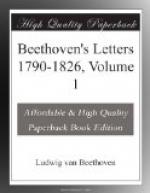39.
TO MESSRS. ARTARIA & CO.[1]
Vienna, June 1, 1805.
I must inform you that the affair about the new quintet
is settled between
Count Fries and myself.
The Count has just assured me that he intends to make you a present of it; it is too late to-day for a written agreement on the subject, but one shall be sent early in the ensuing week. This intelligence must suffice for the present, and I think I at all events deserve your thanks for it.
Your obedient servant,
LUDWIG VAN BEETHOVEN.
[Footnote 1: The quintet is probably not that in C, Op. 29, dedicated to Count v. Fries, previously published in 1803 by Breitkopf & Haertel [see No. 27]. It is more likely that he alludes to a new quintet which the Count had no doubt ordered.]
40.
TO MADAME LA PRINCESSE LIECHTENSTEIN, &C.[1]
November, 1805.
Pray pardon me, illustrious Princess, if the bearer of this should cause you an unpleasant surprise. Poor Ries, my scholar, is forced by this unhappy war to shoulder a musket, and must moreover leave this in a few days, being a foreigner. He has nothing, literally nothing, and is obliged to take a long journey. All chance of a concert on his behalf is thus entirely at an end, and he must have recourse to the benevolence of others. I recommend him to you. I know you will forgive the step I have taken. A noble-minded man would only have recourse to such measures in the most utter extremity. Confident of this, I send the poor youth to you, in the hope of somewhat improving his circumstances. He is forced to apply to all who know him.
I am, with the deepest respect, yours,
L. VAN BEETHOVEN.
[Footnote 1: Communicated by Ries himself, who, to Beethoven’s extreme indignation, did not deliver the note. See Wegeler’s work, p. 134. The following remark is added:—“Date unknown; written a few days before the entrance of the French in 1805” (which took place Nov. 13). Ries, a native of Bonn, was now a French subject, and recalled under the laws of conscription. The Sonata, Op. 27, No. 1, is dedicated to Princess Liechtenstein.]
41.
TO HERR MEYER.[1]
1805.
DEAR MEYER,—
Pray try to persuade Herr v. Seyfried to direct my Opera, as I wish on this occasion to see and hear it myself from a distance; in this way my patience will at all events not be so severely tried as when I am close enough to hear my music so bungled. I really do believe that it is done on purpose to annoy me! I will say nothing of the wind-instruments; but all pp.’s, cresc., discresc., and all f.’s and ff.’s may as well be struck out of my Opera, for no attention whatever is paid to them. I shall lose all pleasure in composing anything in future, if I am to hear it given thus. To-morrow or the day after I will come to fetch you to dinner. To-day I am again unwell.




